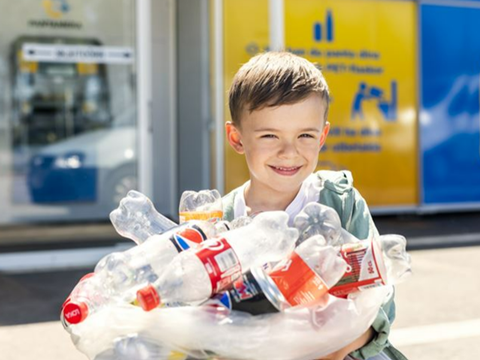
Swedish DRS company Returpack plans to increase deposits on aluminium cans and small and large PET bottles, aiming to make it more attractive for consumers to sort materials properly to benefit the climate and environment.
The company says the deposits will increase from SEK 1 to SEK 2 on aluminium cans and small PET bottles and from SEK 2 to SEK 3 on large PET bottles. Returpack says that in 2023, 2.7 billion packages were deposited and returned to the recycling loop, corresponding to a deposit rate of 88.5 percent and saving 180,000 tons of carbon dioxide.
The numbers for 2024 are currently being processed and are expected to be even higher. The objective for the Swedish DRS is to remain stable above 90%. Returpack states its consumer surveys show a high level of trust in the deposit system. Awareness of the system’s positive impact on the environment and climate has been the strongest driving force, with up to 85% of respondents agreeing. However, in the latest survey, the importance of the deposit amount as a driver has increased.
According to Returpack, the Swedish deposit system currently includes over 11,000 items whose labels and packaging must be updated by the producers. These packages must then be tested, checked and registered in Returpack’s system to ensure the material is suitable for recycling into new beverage containers.
The deposit machines must also be updated to handle the new deposit amounts. The company adds that this controlled withdrawal differentiates the deposit system from other types of recycling, making the DRS a circular system. New deposit packages are due to will appear on the Swedish market during the second half of 2025.
In related news, last April Re-turn reported that over two million drinks containers were returned in the first month of Ireland introducing its national deposit return scheme. At the time of writing, 2193 reverse vending machines were available to consumers across various return locations in Ireland, hoped to improve separate collection and recycling rates for single-use drinks containers across the country.
However, in the same month Polytag and not-for-profit company DDRS Alliance joined forces to develop and adopt a Digital DRS as further delays pushed the launch date for a UK-based DRS back to 2028. Both organizations conducted trials aiming to demonstrate that a Digital DRS is appealing to consumers and ready to implement on a technological level.
If you liked this story, you might also enjoy:
The ultimate guide to the Packaging and Packaging Waste Regulation in 2024
How are the top brands progressing on packaging sustainability?
Sustainable Innovation Report 2024: Current trends and future priorities
Everything you need to know about global plastic sustainability regulation














No comments yet